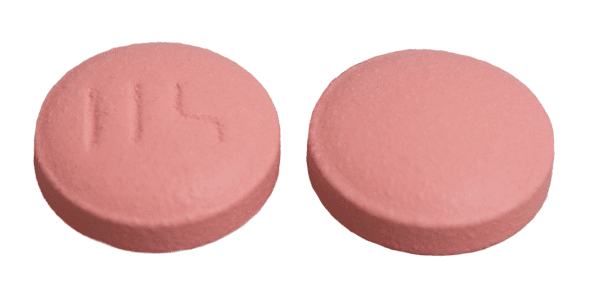Bisoprolol/hydrochlorothiazide and Alcohol/Food Interactions
There are 7 alcohol/food/lifestyle interactions with bisoprolol / hydrochlorothiazide.
Hydrochlorothiazide Alcohol (Ethanol)
Moderate Drug Interaction
Using hydroCHLOROthiazide and bisoprolol together may lower your blood pressure and slow your heart rate. This can cause dizziness, or feeling like you might pass out, weakness, fainting, fast or irregular heartbeats, or loss of blood glucose control. If you take both medications together, tell your doctor if you have any of these symptoms. You may need a dose adjustment or need your blood pressure checked more often to safely use both medications. It is important to tell your doctor about all other medications you use, including vitamins and herbs. Do not stop using any medications without first talking to your doctor.
Hydrochlorothiazide Alcohol (Ethanol)
Moderate Drug Interaction
HydroCHLOROthiazide and ethanol (alcohol) may have additive effects in lowering your blood pressure. You may experience headache, dizziness, lightheadedness, fainting, and/or changes in pulse or heart rate. These side effects are most likely to be seen at the beginning of treatment, following a dose increase, or when treatment is restarted after an interruption. Let your doctor know if you develop these symptoms and they do not go away after a few days or they become troublesome. Avoid driving or operating hazardous machinery until you know how the medications affect you, and use caution when getting up from a sitting or lying position. It is important to tell your doctor about all other medications you use, including vitamins and herbs. Do not stop using any medications without first talking to your doctor.
Bisoprolol Alcohol (Ethanol)
Moderate Drug Interaction
Bisoprolol and ethanol (alcohol) may have additive effects in lowering your blood pressure. You may experience headache, dizziness, lightheadedness, fainting, and/or changes in pulse or heart rate. These side effects are most likely to be seen at the beginning of treatment, following a dose increase, or when treatment is restarted after an interruption. Let your doctor know if you develop these symptoms and they do not go away after a few days or they become troublesome. Avoid driving or operating hazardous machinery until you know how the medications affect you, and use caution when getting up from a sitting or lying position. It is important to tell your doctor about all other medications you use, including vitamins and herbs. Do not stop using any medications without first talking to your doctor.
Hydrochlorothiazide Multivitamins With Minerals
Moderate Drug Interaction
Using hydroCHLOROthiazide and bisoprolol together may lower your blood pressure and slow your heart rate. This can cause dizziness, or feeling like you might pass out, weakness, fainting, fast or irregular heartbeats, or loss of blood glucose control. If you take both medications together, tell your doctor if you have any of these symptoms. You may need a dose adjustment or need your blood pressure checked more often to safely use both medications. It is important to tell your doctor about all other medications you use, including vitamins and herbs. Do not stop using any medications without first talking to your doctor.
Bisoprolol Multivitamins With Minerals
Moderate Drug Interaction
Using bisoprolol together with multivitamin with minerals may decrease the effects of bisoprolol. Separate the administration times of bisoprolol and multivitamin with minerals by at least 2 hours. If your doctor does prescribe these medications together, you may need a dose adjustment or special test to safely use both medications. It is important to tell your doctor about all other medications you use, including vitamins and herbs. Do not stop using any medications without first talking to your doctor.
Switch to professional interaction data
Bisoprolol High Cholesterol (Hyperlipoproteinemia, Hypertriglyceridemia, Sitosterolemia)
Moderate Potential Hazard, Low plausibility
beta-blockers - hyperlipidemia
Beta-adrenergic receptor blocking agents (aka beta-blockers) may alter serum lipid profiles. Increases in serum VLDL and LDL cholesterol and triglycerides, as well as decreases in HDL cholesterol, have been reported with some beta-blockers. Patients with preexisting hyperlipidemia may require closer monitoring during beta-blocker therapy, and adjustments made accordingly in their lipid-lowering regimen.
Hydrochlorothiazide High Cholesterol (Hyperlipoproteinemia, Hypertriglyceridemia, Sitosterolemia)
Moderate Potential Hazard, Moderate plausibility
thiazides - hyperlipidemia
Thiazide diuretics may increase serum triglyceride and cholesterol levels, primarily LDL and VLDL. Whether these effects are dose-related and sustained during chronic therapy are unknown. Patients with preexisting hyperlipidemia may require closer monitoring during thiazide therapy, and adjustments made accordingly in their lipid-lowering regimen
Switch to professional interaction data
Bisoprolol/hydrochlorothiazide drug interactions
There are 632 drug interactions with bisoprolol / hydrochlorothiazide.
Bisoprolol/hydrochlorothiazide disease interactions
There are 29 disease interactions with bisoprolol / hydrochlorothiazide which include:
- bradyarrhythmia/AV block
- cardiogenic shock/hypotension
- CHF
- diabetes
- hemodialysis
- hypersensitivity
- ischemic heart disease
- PVD
- renal/liver disease
- anuria
- electrolyte losses
- liver disease
- lupus erythematosus
- renal function disorders
- cerebrovascular insufficiency
- glaucoma
- hyperlipidemia
- hyperthyroidism
- myasthenia gravis
- pheochromocytoma
- psoriasis
- tachycardia
- asthma/COPD
- asthma
- diabetes
- hyperlipidemia
- hyperparathyroidism
- hyperuricemia
- thyroid function tests
More about bisoprolol / hydrochlorothiazide
- bisoprolol/hydrochlorothiazide consumer information
- Check interactions
- Compare alternatives
- Pricing & coupons
- Reviews (35)
- Drug images
- Side effects
- Dosage information
- During pregnancy
- Drug class: beta blockers with thiazides
- En español
Related treatment guides
Drug Interaction Classification
| Highly clinically significant. Avoid combinations; the risk of the interaction outweighs the benefit. | |
| Moderately clinically significant. Usually avoid combinations; use it only under special circumstances. | |
| Minimally clinically significant. Minimize risk; assess risk and consider an alternative drug, take steps to circumvent the interaction risk and/or institute a monitoring plan. | |
| No interaction information available. |
See also:
Further information
Always consult your healthcare provider to ensure the information displayed on this page applies to your personal circumstances.


